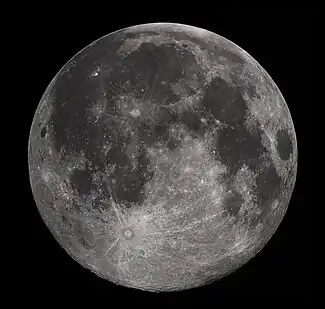Outline of the Moon
The following outline is provided as an overview of and topical guide to the Moon:
Moon – Earth's only permanent natural satellite. It is one of the largest natural satellites in the Solar System, and the largest among planetary satellites relative to the size of the planet that it orbits (its primary). It is the second-densest satellite among those whose densities are known (after Jupiter's satellite Io).
What type of thing is the Moon?
The Moon can be described as all of the following:
- Natural satellite – celestial body that orbits another celestial body of greater mass (e.g. a planet, star, or dwarf planet), called its primary.[1][2] For example, the Moon is a natural satellite of Earth, and Earth is a natural satellite of the Sun.
Characteristics of the Moon
Selenography of the Moon
Selenography – study of the surface and physical features of the Moon. Historically, the principal concern of selenographists was the mapping and naming of the lunar maria, craters, mountain ranges, and other various features. This task was largely finished when high resolution images of the near and far sides of the Moon were obtained by orbiting spacecraft during the early space era. Nevertheless, some regions of the Moon remain poorly imaged (especially near the poles) and the exact locations of many features (like crater depths) are uncertain by several kilometers.
Geographical features on the Moon
Appearance and motion of the Moon
Exploration of the Moon
Flyby and direct lunar missions
- Luna programme
- Pioneer program
- Ranger program
- Zond program
- Surveyor Program
- Lunar Orbiter program
- Apollo program
- Explorer 35
- Explorer 49
- Lunokhod programme
- Mariner program
- International Cometary Explorer
- Hiten
- GEOTAIL
- Clementine
- PAS-22
- Lunar Prospector
- Nozomi
- SMART-1
- SELENE
- Chinese Lunar Exploration Program
- Chandrayaan-1
- Moon Impact Probe
- Lunar Reconnaissance Orbiter
- LCROSS
- ARTEMIS (THEMIS)
- Gravity Recovery and Interior Laboratory (GRAIL)
Proposed lunar missions
See also
- Outline of space science
- Lunar basalt 70017
- Lunar calendar
- Lunisolar calendar
- Craters named after people
- Double planet
- Lunar effect
- Man in the Moon
- Memorials on the Moon
- Month
- Lunar month
- Moon illusion
- Moon in art and literature
- Moon in mythology
- Hjúki and Bil (Norse legends)
- Moon is made of green cheese
- Natural satellite
- Solar System
- Supermoon
- Theia
- Tourism
References
- "Satellite". www.merriam-webster.com. Merriam Webster. Retrieved 16 November 2015.
- Stillman, Dan (16 June 2015). "What Is a Satellite?". www.nasa.gov. NASA. Retrieved 16 November 2015.
External links
- Lunar shelter (building a lunar base with 3D printing)*APOD - Video of lunar drive
- The Moon on Google Maps, a 3-D rendition of the Moon akin to Google Earth
- Cartographic resources
- "Consolidated Lunar Atlas". Lunar and Planetary Institute. Retrieved 26 February 2012.
- Gazetteer of Planetary Nomenclature (USGS) List of feature names.
- "Clementine Lunar Image Browser". U.S. Navy. 15 October 2003. Archived from the original on 7 April 2007. Retrieved 12 April 2007.
- 3D zoomable globes:
- "Google Moon". 2007. Retrieved 12 April 2007.
- "Moon". World Wind Central. NASA. 2007. Retrieved 12 April 2007.
- Aeschliman, R. "Lunar Maps". Planetary Cartography and Graphics. Archived from the original on 29 May 2015. Retrieved 12 April 2007. Maps and panoramas at Apollo landing sites
- Japan Aerospace Exploration Agency (JAXA) Kaguya (Selene) images
- Large image of the Moon's north pole area
- Observation tools
- "NASA's SKYCAL—Sky Events Calendar". NASA Eclipse Home Page. Archived from the original on 20 August 2007. Retrieved 27 August 2007.
- "Find moonrise, moonset and moonphase for a location". 2008. Retrieved 18 February 2008.
- "HMNAO's Moon Watch". 2005. Archived from the original on 4 February 2009. Retrieved 24 May 2009. See when the next new crescent moon is visible for any location.
